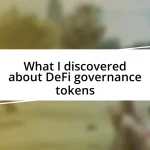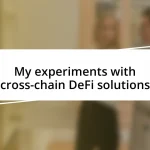Key takeaways:
- Blockchain technology enhances voting security, transparency, and accessibility, potentially restoring voter confidence in electoral processes.
- Challenges include technology complexity, regulatory acceptance, and risks of cyberattacks, necessitating user education and robust security measures.
- Successful case studies from West Virginia, Utah County, and Zug demonstrate the potential of blockchain voting to improve participation and trust in elections.

Introduction to Blockchain Voting Systems
When I first stumbled upon the concept of blockchain voting systems, I was intrigued by the potential to revolutionize how we participate in democracy. Imagine casting your vote in a secure, transparent environment where your voice truly matters. It’s fascinating, isn’t it?
Blockchain technology offers a decentralized approach to voting that aims to increase security and reduce fraud. As I explored the intricacies of this system, I realized how empowering it could be for voters who often feel their choices don’t count. Isn’t it essential to have a voting process that everyone can trust?
Reflecting on the past elections I’ve experienced, I recall the frustrations of long lines and confusion at polling places. Envisioning a future where I could vote from the comfort of my home, knowing my vote was securely recorded and verified, gives me hope. Could blockchain be the key to restoring faith in our electoral processes?

Understanding Blockchain Technology
Blockchain technology is truly a remarkable innovation that underpins the concept of decentralized systems. Picture it as a digital ledger—a trustworthy record that everyone can see, yet no single entity controls. This unique feature not only provides transparency but also ensures that once information is entered, it cannot be altered without consensus from the network.
Here are a few key aspects to help you grasp its potential:
- Decentralization: Unlike traditional systems, there’s no central authority, making it less vulnerable to corruption or manipulation.
- Security: Advanced cryptography secures the data, ensuring that sensitive information remains confidential and safe from tampering.
- Transparency: All transactions are visible to participants, promoting trust among users, which is essential in any voting system.
Reflecting on my own experiences with technology, I once struggled with online platforms that felt cumbersome and opaque. The elegance of blockchain offers a refreshing contrast. I can imagine navigating a voting system built on its principles, where my input matters within a clear framework. The reliability it promises could very well reshape our interactions with democratic processes.

Benefits of Blockchain in Voting
Blockchain technology introduces a level of security that traditional voting systems often lack. I remember a time when I felt uneasy about the integrity of my vote, wondering if it would even be counted. With blockchain, the use of advanced encryption ensures that each vote is securely logged and protected from tampering. This foundational layer of security alleviates my concerns and enhances my confidence in the voting process.
Moreover, the transparency offered by blockchain could transform how we perceive accountability in elections. Reflecting on past experiences where results were questioned, the idea that every vote could be traced and verified makes me hopeful. It’s like having a front-row seat to the unfolding of democracy—no more hidden agendas or mysterious counting methods. This visibility could truly empower voters and build trust in electoral outcomes.
Let’s not forget accessibility, another remarkable advantage of blockchain. I’ve often found myself constrained by physical polling locations, making voting a hassle. Imagine being able to cast my ballot from anywhere, at any time, using blockchain. Such convenience could lead to higher voter turnout, which is essential for a representative democracy. I find it thrilling to think about a future where everyone effortlessly participates, knowing their vote is both secure and significant.
| Benefit | Description |
|---|---|
| Security | Advanced encryption protects votes from tampering. |
| Transparency | Every vote can be traced and verified, building trust. |
| Accessibility | Voting can be done from anywhere, increasing participation. |

Challenges of Implementing Blockchain Voting
When considering the challenges of implementing blockchain voting, one major obstacle is the technology’s complexity. I remember grappling with new tech at work, initially feeling overwhelmed. Many potential users, especially older voters, might feel similarly intimidated by the intricacies of blockchain. How do we ensure accessibility for everyone? It requires thoughtful design and education to create a user-friendly experience, making it crucial to bridge the knowledge gap.
Another significant hurdle lies in regulatory acceptance. From my experience in tech, navigating the legal landscape can be daunting. Governments must not only understand how blockchain functions but also adapt existing voting laws to incorporate this innovation. I wonder how long it might take for policymakers to grasp its potential. Until these regulations are in place, the path to blockchain voting remains riddled with uncertainty and delays.
Lastly, while blockchain offers security, the risk of cyberattacks is still a pressing concern. It’s a bit unsettling, isn’t it? Although the technology is designed to be robust, hackers are constantly evolving. In my own encounters with cybersecurity, I’ve learned that even the most sophisticated systems can fall prey to unforeseen vulnerabilities. Ensuring that robust security measures are consistently in place is vital for the success of any blockchain voting system—after all, trust in the process is everything.

Case Studies of Successful Implementations
One standout example of a successful blockchain voting implementation comes from West Virginia, where the state deployed a blockchain-based mobile voting application for overseas voters in the 2018 elections. As someone who often thinks about how technology can bridge gaps, seeing this approach gave me hope that we can make voting more inclusive. The feedback from voters was overwhelmingly positive, showcasing how even those far from home could feel part of the democratic process. Doesn’t it make you wonder how many voices have remained unheard simply due to accessibility issues?
Over in Utah County, a pilot test of blockchain voting in the 2020 municipal election displayed remarkable results. I recall following the story and feeling a surge of excitement as they reported zero breaches and complete integrity of the voting process. With each ballot verified and safely stored on the blockchain, it illustrated to me just how transformative this technology can be. Can you imagine the ripple effect on public trust if more local governments followed suit?
In 2021, the city of Zug in Switzerland, affectionately known as “Crypto Valley,” successfully enabled residents to vote on local issues using a blockchain-based platform. My personal reaction to this is one of admiration; envisioning citizens fully engaged in the democratic process inspires a sense of unity. The results released within 24 hours reinforced how efficient this system can be, raising the question: could rapid results reshape the expectations we have from elections? It’s thrilling to think about a world where responsiveness and voter engagement go hand in hand.

Future of Blockchain Voting Systems
The future of blockchain voting systems is filled with possibilities that could redefine how we participate in democracy. I often picture a scenario where people can cast their votes from the comfort of their homes, knowing their choices are secure and anonymous. With advancements in user interfaces and educational programs, could we see significant increases in voter turnout, especially among those who have historically felt disconnected from the electoral process?
I can’t help but feel a sense of excitement about the potential for real-time transparency. Imagine voters being able to track their ballots through the blockchain as easily as sending a text message. This level of engagement might just restore faith in elections. Will we finally reach a point where skepticism about vote manipulation fades, replaced with confidence in the system?
As we look ahead, integration with other technologies like artificial intelligence could further enhance these systems. I picture smart algorithms analyzing patterns and ensuring proper security measures are in place, which could make elections not only safer but also more efficient. How amazing would it be if we could adapt to new challenges almost before they arise, fostering a future where every vote truly matters and is accounted for? The roadmap ahead is undoubtedly exciting, isn’t it?

Conclusion and Personal Insights
Reflecting on my journey with blockchain-based voting systems, it’s clear to me that these innovations are not just technical solutions; they embody our aspirations for a more equitable democratic process. I remember discussing this topic with friends over coffee, and the excitement was palpable. We started envisioning a future where every vote is both a personal affirmation and a collective voice, inspiring a deeper connection within communities.
Personally, I’ve come to appreciate the emotional weight of the voting process. When I hear stories of individuals who felt empowered by blockchain technology, it reinforces my belief that progress in this arena is about more than just convenience; it’s about dignity and respect for every voter. Have you ever felt that rush of adrenaline while waiting for election results? Imagine feeling that emotion knowing your vote will be counted accurately, with transparency guiding the process.
The journey ahead is undoubtedly filled with challenges, but I see a world where technology amplifies our shared values rather than dilutes them. As I contemplate the potential of blockchain voting systems, I can’t help but feel a renewed sense of optimism. Do we dare to dream of a democratic landscape where every individual feels their voice matters? I believe we’re already on that path, and it’s thrilling to think about how far we might go together.














